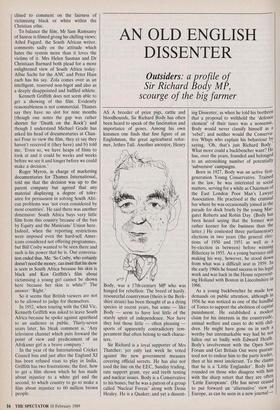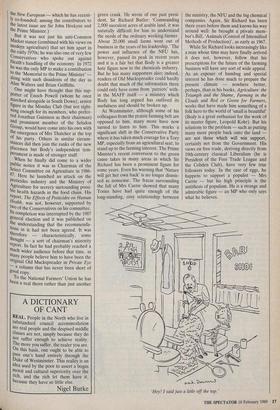AN OLD ENGLISH DISSENTER
Outsiders: a profile of
Sir Richard Body MP, scourge of the big farmer
AS A breeder of prize pigs, cattle and bloodhounds, Sir Richard Body has often been heard to speak of the fascination and importance of genes. Among his own kinsmen one finds that fine figure of an Englishman, the great agricultural refor- mer, Jethro Tull. Another ancestor, Henry seni Body, was a 17th-century MP who was hanged for rebellion. The breed of hardy, resourceful countryman (theirs is the Berk- shire strain) has been thought of as a dying species in recent years, but some — like Body — seem to have lost little of the sturdy spirit of independence. Nor have they lost those little — often pleasing sports of apparently contradictory tem- perament that often belong to such charac- ters.
Sir Richard is a loyal supporter of Mrs Thatcher; yet only last week he voted against the new government measure covering official secrets. He has also not toed the line on the EEC, Sunday trading, rate support grant, eye and teeth testing and nuclear issues. Body is a Conservative to his bones; but he was a patron of a group called 'Nuclear Freeze' along with Denis Healey. He is a Quaker; and yet a dissent-
ing Dissenter, as when he told his brethren that a proposal to withhold the 'defence element' of their taxes was a nonsense. Body would never classify himself as a `rebel'; and neither would the Conserva- tive Whips who explain his behaviour by saying, `Oh, that's just Richard Body. What more could a backbencher want? He has, over the years, founded and belonged to an astonishing number of potentially `subversive' campaigns.
Born in 1927, Body was an active first- generation Young Conservative. Trained in the law, he was interested in social matters, serving for a while as Chairman of the East London Poor Man's Lawyer Association. He practised at the criminal bar where he was occasionally joined in the parade for dock briefs by the young Mar- garet Roberts and Robin Day. (Body has been heard saying that the former was rather keener for the business than the latter.) He contested three parliamentary elections in two years (the general elec- tions of 1950 and 1951 as well as a by-election in between) before winning Billericay in 1955. As a young barrister still making his way, however, he stood down from what was a difficult seat in 1959. In the early 1960s he found success in his legal work and was back in the House represent- ing Holland with Boston in Lincolnshire in 1966.
As a young backbencher he made few demands on public attention, although in 1956 he was noticed as one of the handful of Tories to support the abolition of capital punishment. He established a modest claim for his interests in the countryside, animal welfare and cases to do with chil- dren. He might have gone on in such a worthy but unremarkable way had he not fallen out so badly with Edward Heath. Body's involvement with the Open Seas Forum and Get Britain Out were guaran- teed not to endear him to the party leader, then at his most intolerant. To the claims that he is a 'Little Englander', Body has rounded on those who disagree with him with the sharp retort that they are often `Little Europeans'. (He has never ceased
. to put forward an 'alternative' view of Europe, as can be seen in a new journal — the New European — which he has recent- ly co-founded; among the contributors to the latest issue are Sir John Hoskyns and the Prime Minister.) But it was not just his anti-Common Market stance (combined with his views on modern agriculture) that set him apart in the early 1970s; he was also one of very few Conservatives who spoke out against Heath's handling of the economy. In 1972 he was the only MP to make a contribution to the 'Memorial to the Prime Minister' along with such dissidents of the day as Alan Walters and Brian Griffiths.
One might have thought that this sup- porter of Enoch Powell (whom he once marched alongside in South Down), senior figure in the Monday Club (but not right- vying enough for its members, who prefer- red Jonathan Guinness as their chairman) and prominent member of the Selsdon Group, would have come into his own with the emergence of Mrs Thatcher at the top of his party. Others in similar circum- stances did then join the ranks of the new Placemen but Body's independent tem- perament is made of stronger stuff. When he finally did come to a wider Public notice it was as Chairman of the Select Committee on Agriculture in 1986- 87. Here he launched an attack on the Pesticides industry and the Ministry of Agriculture for secrecy surrounding possi- ble health hazards in the food chain. His report, The Effects of Pesticides on Human Health, was not, however, supported by two of the Conservatives on his committee. Its completion was interrupted by the 1987 general election and it was published on the understanding that the recommenda- tions in it had not been agreed. It was therefore — characteristically, some thought — a sort of chairman's minority report. In fact he had probably reached a Much wider audience before that time, as many people believe him to have been the original Old Muckspreader in Private Eye --- a column that has never been short of good copy. To the National Farmers' Union he has been a real thorn rather than just another green crank. He wrote of one past presi- dent, Sir Richard Butler: 'Commanding 2,000 succulent acres of arable land, it was naturally difficult for him to understand the needs of the ordinary working farmer. About 20,000 small farms went out of business in the years of his leadership.' The power and influence of the NFU has, however, passed its peak in recent years and it is a fair bet that Body is a greater hate figure now to the chemicals industry. But he has many supporters also; indeed, readers of Old Muckspreader could hardly doubt that much of the information there could only have come from 'patriots' with- in the MAFF itself — a ministry which Body has long argued has outlived its usefulness and should be broken up.
At Westminster, although some of his colleagues from the prairie farming belt are opposed to him, many more have now turned to listen to him. This marks a significant shift in the Conservative Party where it has taken much courage for a Tory MP, especially from an agricultural seat, to stand up to the farming interest. The Prime Minister's recent conversion to the green cause takes in many areas in which Sir Richard has been a prominent figure for some years. Even his warning that 'Nature will get her own back' is no longer dismis- sed as nonsense. The fracas surrounding the fall of Mrs Currie showed that many Tories have had quite enough of the long-standing, cosy relationship between the ministry, the NFU and the big chemical companies. Again, Sir Richard has been there years before them and knows his way around well: he brought a private mem- ber's Bill, 'Animals (Control of Intensified Methods of Production)', as early as 1967.
While Sir Richard looks increasingly like a man whose time may have finally arrived it does not, however, follow that his prescriptions for the future of the farming business will have any sort of wide appeal. As an exposer of humbug and special interest he has done much to prepare the present climate — nowhere better, perhaps, than in his books, Agriculture: the Triumph and the Shame, Farming in the Clouds and Red or Green for Farmers, works that have made him something of a folk hero to the world of 'small is beautiful' (Body is a great enthusiast for the work of its master figure, Leopold Kohr). But his solutions to the problem — such as putting many more people back onto the land are not those which will win support, certainly not from the Government. His views on free trade, deriving directly from 19th-century classical Liberalism (he is President of the Free Trade League and the Cobden Club), have very few true followers today. In the case of eggs, he happens to support a populist — Mrs Currie — but his high principle is the antithesis of populism. He is a strange and admirable figure — an MP who only says what he believes.
'Hey! I said just a little off the top.'



















































 Previous page
Previous page